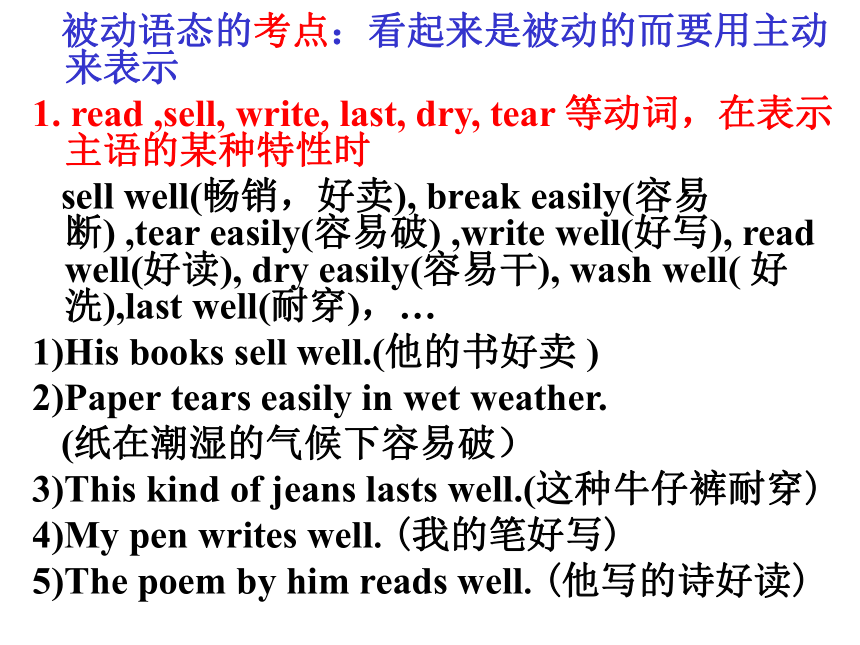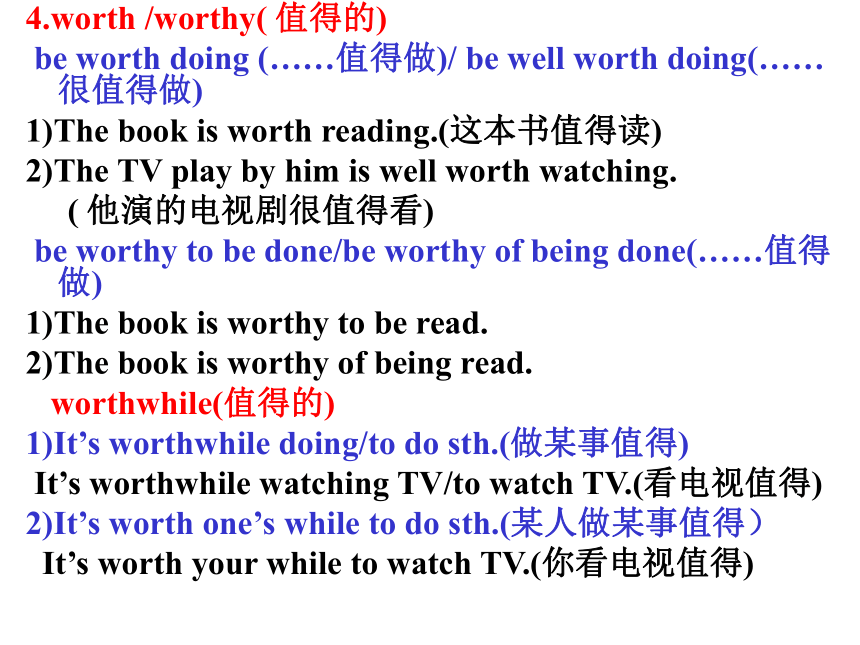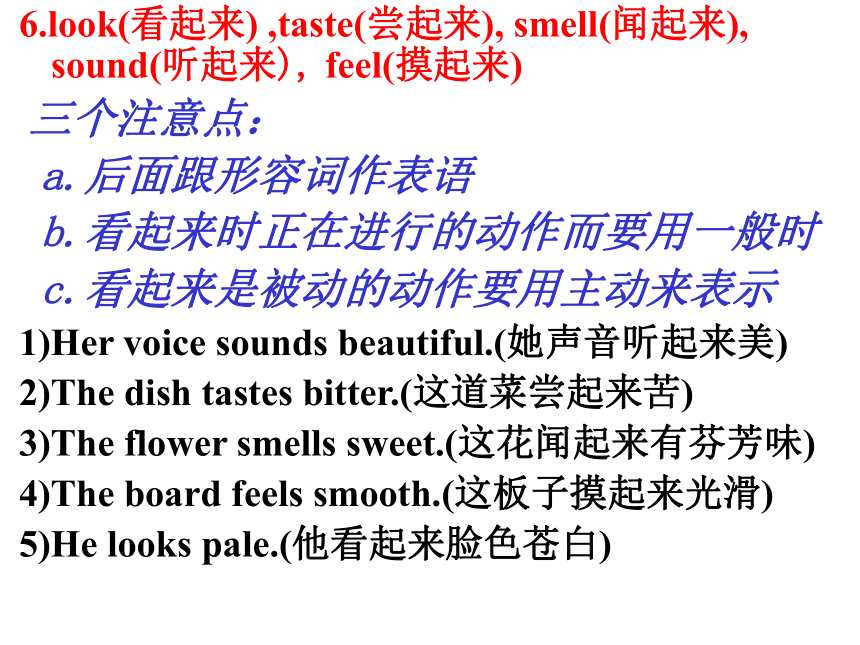【备战2014,教师原创】2014年高考英语语法备考 被动语态课件
文档属性
| 名称 | 【备战2014,教师原创】2014年高考英语语法备考 被动语态课件 |  | |
| 格式 | zip | ||
| 文件大小 | 355.7KB | ||
| 资源类型 | 教案 | ||
| 版本资源 | |||
| 科目 | 英语 | ||
| 更新时间 | 2014-03-24 19:35:16 | ||
图片预览






文档简介
课件13张PPT。被动语态考点 被动语态的考点:看起来是被动的而要用主动来表示
1. read ,sell, write, last, dry, tear 等动词,在表示主语的某种特性时
sell well(畅销,好卖), break easily(容易断) ,tear easily(容易破) ,write well(好写), read well(好读), dry easily(容易干), wash well( 好洗),last well(耐穿),…
1)His books sell well.(他的书好卖 )
2)Paper tears easily in wet weather.
(纸在潮湿的气候下容易破)
3)This kind of jeans lasts well.(这种牛仔裤耐穿)
4)My pen writes well.(我的笔好写)
5)The poem by him reads well.(他写的诗好读)2.prove(证明,证实)
作“证实”时可以用于被动语态;作“证明”时不用于被动语态(但在阅读中我们也会见到用被动的情况)
1)His theory was proved last year.( 他的理论去年得到了证实)
2)Your answer proved (to be) right.(你的答案证明是对的)
3)You prove (to be) an honest man.(你证明是个诚实的人)
3.want/need/require(需要 )
谓语动词是“需要”,后面跟动词作宾语且与句子主语是逻辑上的动宾关系,要么用doing,要么用to be done
1)Our classroom needs cleaning/to be cleaned every day.
(我们教室需要每天打扫)
2)The old man wants looking after/to be looked after.
(这位老人需要照顾)
3) Your hair requires cutting/to be cut.
(你的头发需要理了)
4.worth /worthy( 值得的)
be worth doing (……值得做)/ be well worth doing(……很值得做)
1)The book is worth reading.(这本书值得读)
2)The TV play by him is well worth watching.
( 他演的电视剧很值得看)
be worthy to be done/be worthy of being done(……值得做)
1)The book is worthy to be read.
2)The book is worthy of being read.
worthwhile(值得的)
1)It’s worthwhile doing/to do sth.(做某事值得)
It’s worthwhile watching TV/to watch TV.(看电视值得)
2)It’s worth one’s while to do sth.(某人做某事值得)
It’s worth your while to watch TV.(你看电视值得)我们学校值得参观。
1)Our school is worth visiting.
2)Our school is worth a visit.
3)Our school is worthy to be visited.
4)Our school is worthy of being visited.
5)Our school is worthy of a visit.
5. be to seek(寻找),be to let(出租),be to blame(应该受到责备)
1)The cause is to seek.( 原因在寻找)
2)The room is to let.(此房出租)
3)The girl was to blame yesterday.(那女孩昨天应该受到责备)
6.look(看起来) ,taste(尝起来), smell(闻起来), sound(听起来), feel(摸起来)
三个注意点:
a.后面跟形容词作表语
b.看起来时正在进行的动作而要用一般时
c.看起来是被动的动作要用主动来表示
1)Her voice sounds beautiful.(她声音听起来美)
2)The dish tastes bitter.(这道菜尝起来苦)
3)The flower smells sweet.(这花闻起来有芬芳味)
4)The board feels smooth.(这板子摸起来光滑)
5)He looks pale.(他看起来脸色苍白)
7.不定式作定语的三种情况
1)当前面的名词和不定式是逻辑上的主谓关系时用主动式
They made some candles to give light.
2)当前面的名词和不定式是逻辑上的动宾关系时用被动式
Do you have anything to be taken there?
3)当前面的名词和不定式是逻辑上的动宾关系但与句中另一名词或者代词又是主谓关系时用主动式表被动含义
Please give me some bread to eat.
I have much homework to do.
看看下面句子的区别:
1)I’m going to the post office.Do you have a letter to be sent?
2)Are you going to the post office this afternoon.Do you have a letter to send?8.某些形容词作表语后面跟动词不定式,且不定式和句子主语具有逻辑上的动宾关系时用主动式表被动含义。
1)The question is easy to answer.
但如果后面加上by sb.时仍用被动式。
The question is easy to be answered by me.
2)The box is too heavy to move.
3)My coat is too large to wear.
但是:
形容词的意思不完整时仍然用被动表被动
All invaders are sure to be punished.
9.表示开始和结束的动词常用主动表被动(begin, start ,finish, end,close ,open…..)
Class begins at 6:30 every day
The shop closes at 6 sharp every Sunday
10.cook, print, bind 等动词的进行时态用主动表被动含义。
1) The paper is printing.
2)My book is binding.
3)The meat is cooking.
11.get+done也属于被动结构
get burnt(烧焦,晒黑) get lost(迷路)
get dressed(穿衣服) get changed(换衣服)
get separated(分开) get drunk(喝醉)
get engaged(订婚) get married(结婚)
get hurt(受到伤害) get paid(得报酬)
get stuck=get caught(陷入困境)
12.under +n.表被动
under construction(在建设中) under arrest(被捕)
under discussion(在讨论中) under treatment(在治疗中)
under repair(在修理) under fire(受到攻击)
under attack( 受到进攻) under control(被控制住)
.13.一些介词短语含被动含义
in sight (看得见) out of sight(看不见)
out of control(失控) on show(在展览)
on sale(在甩卖) out of repair(失修)
beyond description(难以描绘)
beyond imagination (难以想象)
beyond control (难以控制)
14.下列动词(短语)不能用于被动语态
happen(发生) remain (剩下)
disappear(消失) break out(发生,爆发)
take place(发生) belong to(属于)
give out (精疲力竭) come about (发生)…
The story happened in 1949.
Ten yuan remained last week.(上个星期剩十元)
It’s true that my book disappeared yesterday.
A big fire broke out last year in China.
Great changes have taken place here.
That TV set belongs to her.
They gave out after studying a long time.(学了很长时间后他们精疲力竭)
How did the story come about?(这个故事是怎样发生的?)
注意此句型:
How does/did it come about that…?(……是怎么回事?)
How does it come about that you always sleep in class?
(你在课堂上总是睡觉是怎么回事?)
How did it come about that he didn’t come yesterday?
(他昨天没有来是怎么回事?)
注意:
run out(被用完)没有被动语态 ,come up(被提出)没有被动语态
run out of(用完) 但不用于被动语态
come up with(提出) 但也不用于被动语态
1)My money has run out.
2)I have run out of my money.
不说:My money has been run out of.
3)The question came up at the meeting.
4)We came up with the question at the meeting.
不说:The question was come up with at the meeting.
1. read ,sell, write, last, dry, tear 等动词,在表示主语的某种特性时
sell well(畅销,好卖), break easily(容易断) ,tear easily(容易破) ,write well(好写), read well(好读), dry easily(容易干), wash well( 好洗),last well(耐穿),…
1)His books sell well.(他的书好卖 )
2)Paper tears easily in wet weather.
(纸在潮湿的气候下容易破)
3)This kind of jeans lasts well.(这种牛仔裤耐穿)
4)My pen writes well.(我的笔好写)
5)The poem by him reads well.(他写的诗好读)2.prove(证明,证实)
作“证实”时可以用于被动语态;作“证明”时不用于被动语态(但在阅读中我们也会见到用被动的情况)
1)His theory was proved last year.( 他的理论去年得到了证实)
2)Your answer proved (to be) right.(你的答案证明是对的)
3)You prove (to be) an honest man.(你证明是个诚实的人)
3.want/need/require(需要 )
谓语动词是“需要”,后面跟动词作宾语且与句子主语是逻辑上的动宾关系,要么用doing,要么用to be done
1)Our classroom needs cleaning/to be cleaned every day.
(我们教室需要每天打扫)
2)The old man wants looking after/to be looked after.
(这位老人需要照顾)
3) Your hair requires cutting/to be cut.
(你的头发需要理了)
4.worth /worthy( 值得的)
be worth doing (……值得做)/ be well worth doing(……很值得做)
1)The book is worth reading.(这本书值得读)
2)The TV play by him is well worth watching.
( 他演的电视剧很值得看)
be worthy to be done/be worthy of being done(……值得做)
1)The book is worthy to be read.
2)The book is worthy of being read.
worthwhile(值得的)
1)It’s worthwhile doing/to do sth.(做某事值得)
It’s worthwhile watching TV/to watch TV.(看电视值得)
2)It’s worth one’s while to do sth.(某人做某事值得)
It’s worth your while to watch TV.(你看电视值得)我们学校值得参观。
1)Our school is worth visiting.
2)Our school is worth a visit.
3)Our school is worthy to be visited.
4)Our school is worthy of being visited.
5)Our school is worthy of a visit.
5. be to seek(寻找),be to let(出租),be to blame(应该受到责备)
1)The cause is to seek.( 原因在寻找)
2)The room is to let.(此房出租)
3)The girl was to blame yesterday.(那女孩昨天应该受到责备)
6.look(看起来) ,taste(尝起来), smell(闻起来), sound(听起来), feel(摸起来)
三个注意点:
a.后面跟形容词作表语
b.看起来时正在进行的动作而要用一般时
c.看起来是被动的动作要用主动来表示
1)Her voice sounds beautiful.(她声音听起来美)
2)The dish tastes bitter.(这道菜尝起来苦)
3)The flower smells sweet.(这花闻起来有芬芳味)
4)The board feels smooth.(这板子摸起来光滑)
5)He looks pale.(他看起来脸色苍白)
7.不定式作定语的三种情况
1)当前面的名词和不定式是逻辑上的主谓关系时用主动式
They made some candles to give light.
2)当前面的名词和不定式是逻辑上的动宾关系时用被动式
Do you have anything to be taken there?
3)当前面的名词和不定式是逻辑上的动宾关系但与句中另一名词或者代词又是主谓关系时用主动式表被动含义
Please give me some bread to eat.
I have much homework to do.
看看下面句子的区别:
1)I’m going to the post office.Do you have a letter to be sent?
2)Are you going to the post office this afternoon.Do you have a letter to send?8.某些形容词作表语后面跟动词不定式,且不定式和句子主语具有逻辑上的动宾关系时用主动式表被动含义。
1)The question is easy to answer.
但如果后面加上by sb.时仍用被动式。
The question is easy to be answered by me.
2)The box is too heavy to move.
3)My coat is too large to wear.
但是:
形容词的意思不完整时仍然用被动表被动
All invaders are sure to be punished.
9.表示开始和结束的动词常用主动表被动(begin, start ,finish, end,close ,open…..)
Class begins at 6:30 every day
The shop closes at 6 sharp every Sunday
10.cook, print, bind 等动词的进行时态用主动表被动含义。
1) The paper is printing.
2)My book is binding.
3)The meat is cooking.
11.get+done也属于被动结构
get burnt(烧焦,晒黑) get lost(迷路)
get dressed(穿衣服) get changed(换衣服)
get separated(分开) get drunk(喝醉)
get engaged(订婚) get married(结婚)
get hurt(受到伤害) get paid(得报酬)
get stuck=get caught(陷入困境)
12.under +n.表被动
under construction(在建设中) under arrest(被捕)
under discussion(在讨论中) under treatment(在治疗中)
under repair(在修理) under fire(受到攻击)
under attack( 受到进攻) under control(被控制住)
.13.一些介词短语含被动含义
in sight (看得见) out of sight(看不见)
out of control(失控) on show(在展览)
on sale(在甩卖) out of repair(失修)
beyond description(难以描绘)
beyond imagination (难以想象)
beyond control (难以控制)
14.下列动词(短语)不能用于被动语态
happen(发生) remain (剩下)
disappear(消失) break out(发生,爆发)
take place(发生) belong to(属于)
give out (精疲力竭) come about (发生)…
The story happened in 1949.
Ten yuan remained last week.(上个星期剩十元)
It’s true that my book disappeared yesterday.
A big fire broke out last year in China.
Great changes have taken place here.
That TV set belongs to her.
They gave out after studying a long time.(学了很长时间后他们精疲力竭)
How did the story come about?(这个故事是怎样发生的?)
注意此句型:
How does/did it come about that…?(……是怎么回事?)
How does it come about that you always sleep in class?
(你在课堂上总是睡觉是怎么回事?)
How did it come about that he didn’t come yesterday?
(他昨天没有来是怎么回事?)
注意:
run out(被用完)没有被动语态 ,come up(被提出)没有被动语态
run out of(用完) 但不用于被动语态
come up with(提出) 但也不用于被动语态
1)My money has run out.
2)I have run out of my money.
不说:My money has been run out of.
3)The question came up at the meeting.
4)We came up with the question at the meeting.
不说:The question was come up with at the meeting.
